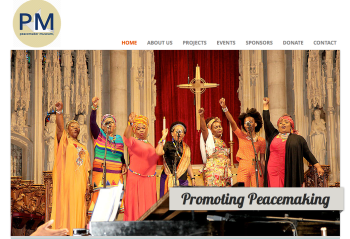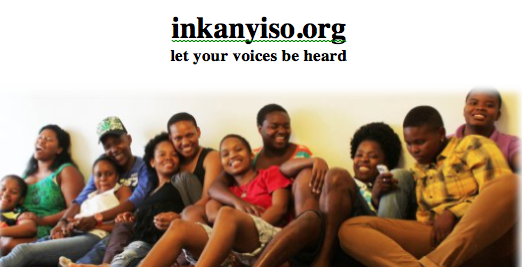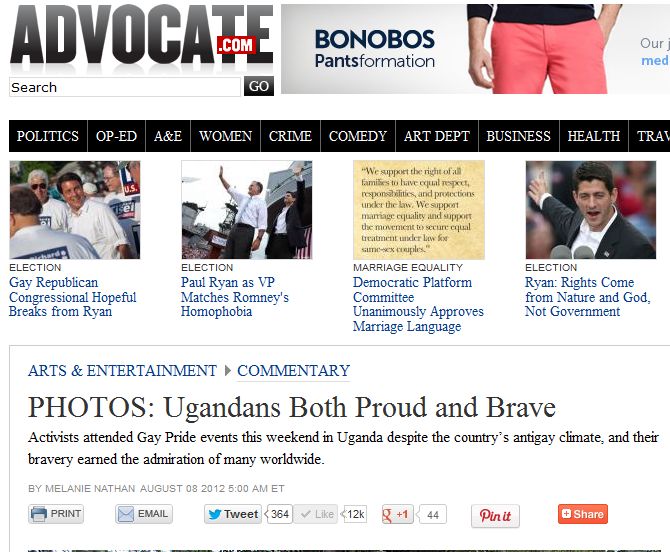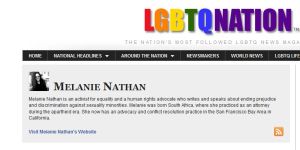Includes Other Men who have Sex with Men (MSM) | The report examines the progress and shortcomings of PEPFAR, the Global Fund, and the UNGASS reporting system, managed by UNAIDS, and draws on data collected from on-the-ground researchers in eight countries: China, Ethiopia, Guyana, India, Mozambique, Nigeria, Ukraine, and Viet Nam.
 NEW YORK, January 18, 2012—Funding to prevent and treat HIV/AIDS consistently fails to reach programs designed to control the disease among gay men and other men who have sex with men (MSM), according to a new analysis released Wednesday by amfAR, The Foundation for AIDS Research and the Center for Public Health and Human Rights (CPHHR) at Johns Hopkins University. The report finds that resources dedicated to addressing the epidemic among MSM are grossly insufficient, and that funding intended for this population is often diverted away from MSM-related services.
NEW YORK, January 18, 2012—Funding to prevent and treat HIV/AIDS consistently fails to reach programs designed to control the disease among gay men and other men who have sex with men (MSM), according to a new analysis released Wednesday by amfAR, The Foundation for AIDS Research and the Center for Public Health and Human Rights (CPHHR) at Johns Hopkins University. The report finds that resources dedicated to addressing the epidemic among MSM are grossly insufficient, and that funding intended for this population is often diverted away from MSM-related services.
Despite Obama Administration leadership in setting bold new targets to tackle global AIDS and highlight the human rights of MSM and other sexual minorities, U.S. government aid intended to prevent and treat HIV infection among MSM continues to encounter obstacles throughout the world.
The new report, “Achieving an AIDS-Free Generation for Gay Men and Other MSM,” provides the most comprehensive analysis to date of HIV-related funding and programming for this population. Focusing on eight countries, the report finds that national governments have failed to adequately tackle the epidemic among MSM. The findings are especially dire in countries that criminalize MSM. In those settings, governments spend fewer resources on HIV-related health services for MSM, do less to track and understand the epidemic, and are more likely to repurpose donor funds intended to fight the epidemic among MSM.
International efforts such as the U.S. President’s Emergency Plan for AIDS Relief (PEPFAR) and the Global Fund to Fight AIDS, Tuberculosis and Malaria have made great strides against the global epidemic, including more recent efforts to reach MSM. Yet these and other donors typically fail to collect and analyze basic information about the epidemic among MSM. In settings where MSM are persecuted, this lack of data is often used to justify under-funding and marginalization.
“These data show an astonishing lack of support for MSM populations around the world, but most especially in countries where MSM are criminalized and persecuted,” said amfAR CEO Kevin Robert Frost. “Gay men and other MSM pioneered the global response to HIV in developed countries and have contributed significantly to the development of programs globally. However, they have been mostly excluded from these very services and programs in the developing world. This report lays out concrete steps that donors and national governments should take without delay to address the pandemic among MSM.”
The report examines the progress and shortcomings of PEPFAR, the Global Fund, and the UNGASS reporting system, managed by UNAIDS, and draws on data collected from on-the-ground researchers in eight countries: China, Ethiopia, Guyana, India, Mozambique, Nigeria, Ukraine, and Viet Nam. Using a standardized evaluation tool, civil society consultants studied the funding and implementation of MSM-related programming. Each consultant uncovered a range of issues related to funding allocations and service delivery, providing an in-depth view of the challenges facing MSM and their access to HIV treatment, care, and prevention services.
Among their findings:
- With few exceptions, MSM are deprioritized and marginalized by HIV programs regardless of epidemic type or disease burden. For example, this analysis found that in Guyana, funding for MSM programs dropped 96% between initial proposal and final budget.
- Epidemiological surveillance of MSM in many countries is woefully inadequate to determine the true burden of HIV among MSM. This makes it much more difficult for international monitors, including UNGASS, to assess the needs of MSM in each country, and further complicates allocation and monitoring by donors.
- In countries where homosexuality is criminalized, such as Nigeria and Ethiopia, many MSM forgo seeking medical care out of fear of government-sanctioned punishment. Despite billions of dollars in funding for HIV programs, both countries continue to make international headlines for persecution and violence against MSM.
- Efforts to streamline donor bureaucracy are being undertaken without consideration of their impact on vulnerable populations. Consolidated funding streams, broad health systems investments, and reduced reporting requirements may ultimately undercut efforts to direct money to more effective interventions.
In addition to the eight country reports, the overall report also includes recommendations for national governments, PEPFAR, the Global Fund, and UNGASS.
“For the first time, we have specific data to help us understand why MSM are omitted from national HIV/AIDS surveillance systems and are subsequently excluded from HIV/AIDS services in countries that rely on foreign assistance from international donors,” said Stefan Baral, associate director of the CPHHR at Johns Hopkins Bloomberg School of Public Health. “As an international community, we must take these data and work with donors and governments to better address the needs of gay men and other MSM throughout the world. We will never create an ‘AIDS-free generation’ if we don’t get the epidemic under control among MSM.”
SEE FUL REPORT AT amfARsite
amfAR, The Foundation for AIDS Research, is one of the world’s leading nonprofit organizations dedicated to the support of AIDS research, HIV prevention, treatment education, and the advocacy of sound AIDS-related public policy. Since 1985, amfAR has invested nearly $325 million in its programs and has awarded grants to more than 2,000 research teams worldwide.About the Center for Public Health and Human Rights at Johns Hopkins University -The Center for Public Health and Human Rights at Johns Hopkins focuses on using the scientific tools of public health to address the health and rights of populations in need. The Center is active in Asia, Africa, and the Former Soviet Union and works with sexual minorities, people who use drugs, and refugees and displaced communities in conflict.
 By Melanie Nathan
By Melanie Nathan
[email protected]
Tweets – @melanienathan1




















 PoochParkWear customizes hoodies and t-shirts, the good, the naughty, the in between, whether proud or quirky let them be seen. We also offer biker jackets, croc or pleather collars, a variety of collar charms, and our special Zinja beaded collars made by a co-op of HIV-positive South African women, the Sisonke women who weave the beads onto the collars.
PoochParkWear customizes hoodies and t-shirts, the good, the naughty, the in between, whether proud or quirky let them be seen. We also offer biker jackets, croc or pleather collars, a variety of collar charms, and our special Zinja beaded collars made by a co-op of HIV-positive South African women, the Sisonke women who weave the beads onto the collars.

Leave a Reply